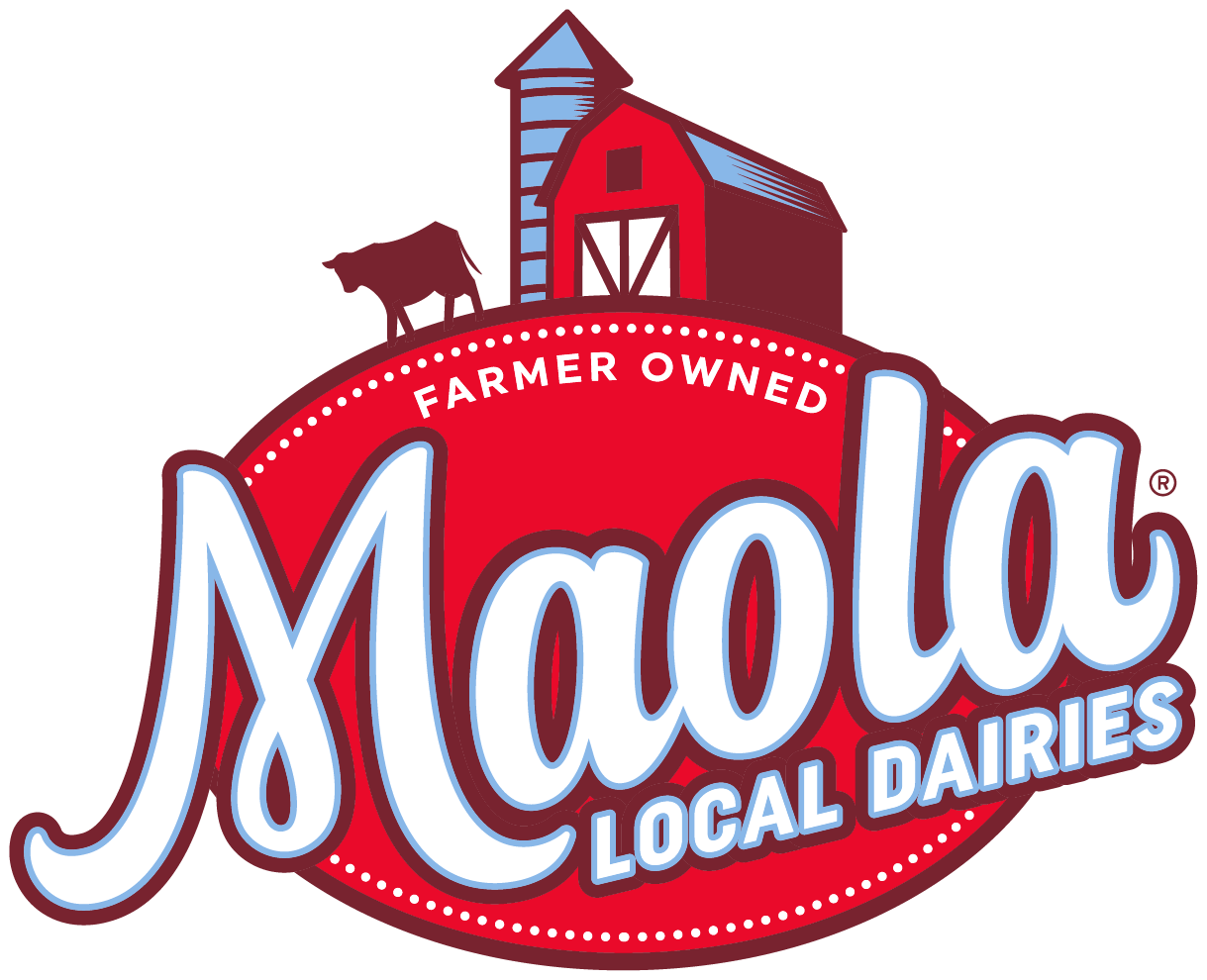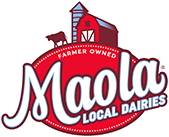You have questions. We have answers. Over the years, we’ve compiled answers to some frequently asked questions about Maola local dairy products, so we’ve listed them here. If you need additional information, we’re always willing to answer your questions by calling 844-287-1970 or you can reach us at emailus@maolamilk.com.
Frequently Asked Questions
Questions about our farms
Where does Maola local milk come from?
Maola independent family farms are located throughout the Mid-Atlantic and many Southeastern states. We package the milk from these farms at our nearest bottling facility and deliver it to the closest neighborhood stores to ensure its fresh dairy goodness, reducing the miles that the milk has to travel to reach you.
What size are Maola’s farms?
The average Maola Local Dairies farm size is around 150 cows. Please remember that some are larger and some are smaller family owned and run enterprises. Dairy farming is a very diverse industry, and there is room for all sizes of dairy farms.
Does Maola support humane treatment of animals?
Yes! Maola Local Dairies has always taken animal care very seriously. We require that all our farmers meet or exceed industry standards and regulations regarding animal welfare. Willful mistreatment of animals is unacceptable and inconsistent with our farmers’ values.
How do you ensure that the animals are well cared for on your owners’ farms?
Maola’s farmer-owners know that quality milk comes from healthy and well-cared for cows. Maola’s farmers provide routine health care, a nutritious diet and proper sanitation procedures for milking to ensure their animals produce wholesome, nutrient-rich dairy products. In addition, Maola’s local dairy farmers are proud supporters and participants in National Dairy FARM (Farmers Assuring Responsible Management) Program(tm). FARM is a nation-wide, verifiable program that addresses animal well-being. The dairy industry has an excellent track record of responsible management practices; this effort simply brings consistency and uniformity to on-farm care and provides reassurance to our consumers.
How much milk does a cow give each day?
On average, a dairy cow will produce 6–7 gallons of milk each day.
What do cows eat?
Cows eat about 100 pounds of feed each day, which is a combination of hay, grain and silage (fermented corn or grass). They drink a lot of water too—up to 50 gallons a day.
How many breeds of dairy cattle are there?
There are six main breeds of dairy cows: Ayrshire, Brown Swiss, Guernsey, Holstein, Jersey and Milking Shorthorn.
Why do farmers treat cows with antibiotics?
Sometimes, dairy cows get sick, just as people do. Without proper medical care, the cows would become seriously ill or die. So, it is simply humane to treat them—and make them well again with medications prescribed by veterinarians. If a dairy cow is treated with antibiotics, she is kept in a separate pen or milking group. The milk from that cow is disposed of, and does not reach the food supply.
How do Maola farmers care for newborn calves?
Maola’s local dairy farmers provide comfortable, safe and hygienic conditions for both mother and calf during the birthing process and beyond. Because our local dairy farmers care about the health of their calves, they are placed into separate living quarters shortly after birth to control their environment and protect their health. Since newborn calves need time to build up their immune systems it is safer to separate them from older cows—and the possible germs those animals could pass along. Shortly after birth, farmers make sure that newborn calves receive two quarts of colostrum—the mother’s first milk after giving birth. Colostrum is high in fat and protein and most importantly, it contains antibodies that help strengthen the calf’s immune system. When calves are left to nurse their mothers, they usually don’t receive enough colostrum on their own. That’s why dairy farmers often step in and feed them colostrum from a bottle.
Questions about our products
Where can I purchase Maola products in my area?
You can visit the Where To Buy section to enter your location and preferred search radius, and a list of stores that carry Maola products in your area will be generated.
Why can’t I find any stores in my area?
Unfortunately, if your zip code doesn’t generate any grocery store matches, then the product has no distribution in your area at this time. We apologize for any inconvenience; we do encourage you to check back again at a later date, as distribution may become available in your area.
If I have a quality concern with a Maola product I just purchased, how should I contact you?
For prompt assistance with any kind of quality concern with one of our products it is best to contact us via emailus@maolamilk.com and provide us with as much information as possible about the product, including the code on the package, date and location where purchased, description of concern, and feel free to attach any photos you may have. You may also contact us via phone at 800-768-6243.
What are the nutritional benefits of Maola Milk?
Milk is an excellent source of calcium, phosphorus, riboflavin, and a good source of protein.
Studies show that up to 78% of Americans suffer from calcium deficiency and Maola milk is an excellent source of easily absorbed calcium.
Are Maola milk products kosher?
All Maola milk products come from facilities that use Kosher-certified practices. Since some of our milks come from multiple local bottling facilities, if the certifying agencies are different, we omit adding the symbol to the label, to avoid consumer confusion. Each plant follows Good Manufacturing Practices (GMP) and has strict cleaning procedures between production runs.
How long is Maola milk good past the date on the container?
Storage and handling factors can greatly impact the quality of our milk products. If stored under proper conditions (between 33 and 40°F), we guarantee its freshness up to the sell-by date if unopened. Our pasteurized milk products are best when consumed within 5-7 days and our ultra-pasteurized products are freshest-tasting within 7 days of opening. It is easy (though not always pleasant) to identify spoilage in a dairy product. If it looks, smells, and tastes OK, it is probably OK to consume, within the above timeframes.
What does the Code Date on the container mean?
The Sell By date on the container means that the product should remain fresh up to that date, if it is unopened and properly stored. The proper temperature for a refrigerator is 33°F – 40°F.
Can I freeze Maola milk?
Yes! You can freeze Maola milk to preserve it, for up to 30 days. You may want to avoid freezing creams, though – upon thawing, you may end up with a grainy product that will not whip well. Always thaw frozen milk in the refrigerator.
Are your products gluten-free?
Maola milk products are gluten-free. In fact, all milk products are gluten-free, naturally.
Are Maola milk containers recyclable?
Yes, Maola milk containers can be recycled and we encourage all of our customers to recycle. We use #2, High Density Polyethylene (HDPE) plastic packaging for our milk jugs and bottles, and #4, Low Density Polyethylene (LDPE) plastic for our caps. #2 and #4 plastic packaging is widely accepted in most communities where recycling programs are offered. For paperboard carton recycling, please refer to your county’s recycling department’s guidelines. In addition, you may check the online resource provided by TetraPak, our carton supplier, at www.recyclecartons.com.
Questions about our bottling process
What is homogenized milk?
Homogenization has been used for many decades in milk bottling. It is the process of physically reducing the size of the fat globules through application of pressure to make them equally disperse in milk rather than separating as cream. Based on consumer preference, most of the milk sold in the U.S. is homogenized.
Is Maola milk pasteurized?
Yes, all milk intended for direct consumption should be pasteurized—it’s a matter of food safety. Pasteurization is a simple, effective method to kill potentially harmful bacteria without affecting the taste or nutritional value of milk. With standard pasteurization, milk is heated to a temperature of at least 161 degrees Fahrenheit for at least 15 seconds, followed by rapid cooling.
What’s the difference between pasteurized and ultra-pasteurized milk?
Maola offers both pasteurized and ultra-pasteurized milk to satisfy consumer needs. Pasteurization involves the heating of milk to eliminate pathogenic bacteria. Ultra-pasteurization is a similar process, only it requires milk to be heated to a higher temperature and to be cooled down faster, to keep it fresh, safe and nutritious for longer than can be achieved with traditional pasteurization.
What is Ultra-Pasteurization?
Maola Ultra-Pasteurized milks are delicious and packed full of protein and other essential nutrients like our regular varieties. The only difference is that it has been heated to approximately 280 °F for a couple seconds and then cooled down rapidly to keep it fresh, safe, and nutritious for longer than can be achieved with traditional pasteurization. When properly stored and refrigerated, Ultra-Pasteurized milk stays fresh longer. Ultra-Pasteurized products should be consumed within seven days of opening.
What is HTST Pasteurization?
High Temperature Short Time pasteurization is the most common form of heat treatment used in the dairy industry. During this process, milk is heated to 161°F for 15 seconds. This kills any pathogenic bacteria that may be present, to ensure fresh, wholesome milk that can be safely consumed.
Do you add Vitamins to Maola milk?
Yes, all our milk products contain added vitamins, as detailed on the label. We add Vitamin D3 to all whole milk products and Vitamins A&D to the fat free/skim, 1% lowfat, and 2% reduced fat milks.
How do you reduce the fat in the milk?
Fat Free/Skim (<0.5%), Lowfat (1%), and Reduced Fat (2%) milks are generated through the removal of fat with the use of centrifugal force until the appropriate level of butterfat is achieved. The remaining butterfat is used for other dairy products, such as Half & Half, Heavy Cream, or Ice Cream Mix.
Why is the cocoa in your chocolate milks alkalized?
The cocoa used in our chocolate milk products follows the Dutch processing method used since the early 19th century. The cocoa is alkalized to darken it and give it a richer flavor.
Are there antibiotics in Maola milk?
No. Maola milk is rigorously tested for antibiotics. several times before it ever ends up on the grocery store shelves. Our local dairy farmers take the first step on their farm to ensure that any milk from cows treated with antibiotics does not end up in the food supply. Every truckload of milk shipped from our family-owned dairies is tested for antibiotics and for other quality measures. If the milk does not meet quality standards, it is discarded.
Are there hormones added to Maola milk?
No, we never add hormones to our milk products. Hormones, however, are naturally present in many foods of plant and animal origin, including milk.
Do Maola dairy farmers use artificial growth hormones (rBST/rBGH)?
No. Maola farmers do not treat their cows with artificial growth hormones.
Are your products rBST free?
Yes. Maola dairy farmers do not use rBST on their farms.
What is rBST or BGH?
Bovine somatotropin (BST) is a hormone that occurs naturally in all cows, and its physiological function is to help direct milk production. Through biotechnology, scientists have created a synthesized copy of BST—known as rBST—which some dairy farmers choose to use as a milk production management tool on some cows. None of the Maola farmer-owners use artificial growth hormones.
Are there pesticides in milk?
No. Stringent federal standards ensure that all milk is safe, pure and nutritious. The most recent government testing found that all of the milk samples tested were completely free from pesticide residue.

